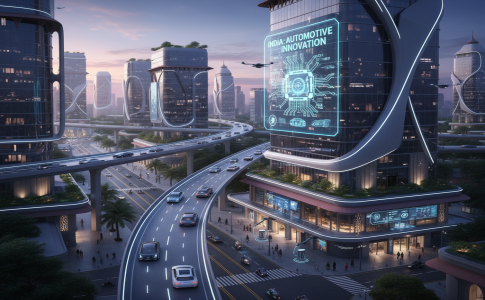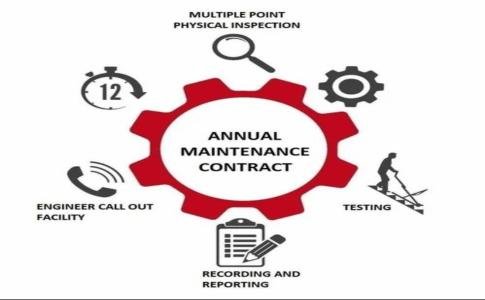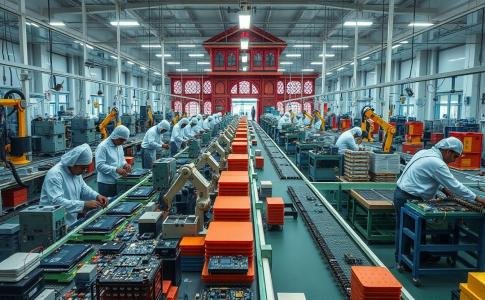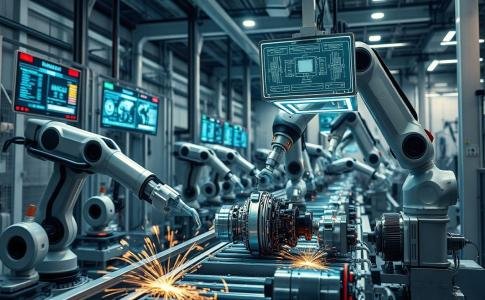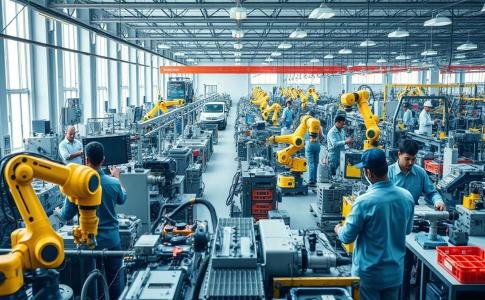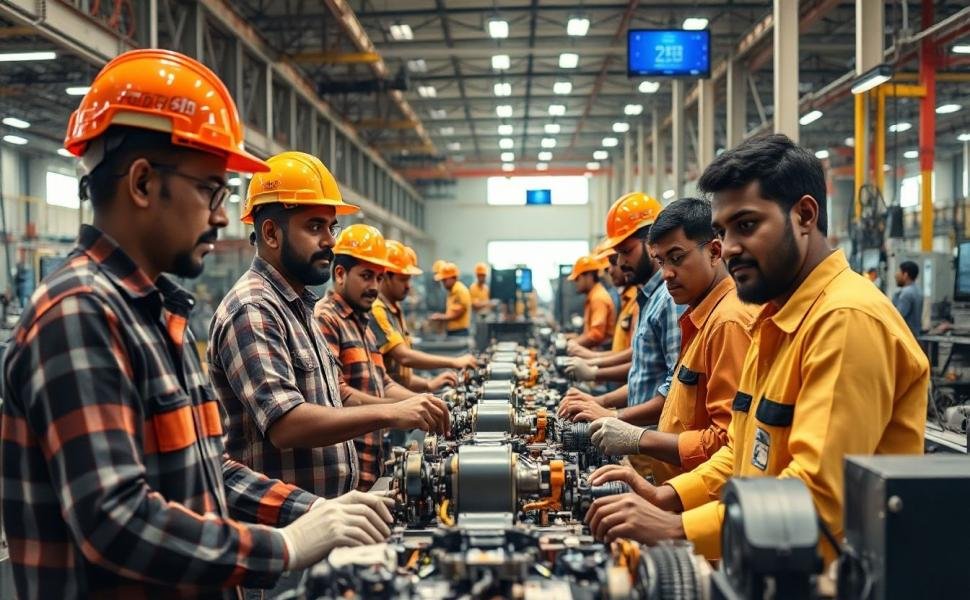
June 26 2025
The State of Mechanical Engineering and Manufacturing Salaries in India (2025): A Middle-Class Perspective
Introduction: Understanding Mechanical Engineering Salaries in India's Middle-Class Context
In India's rapidly evolving industrial landscape, mechanical engineering and manufacturing remain cornerstone sectors driving economic growth. As we navigate 2025, professionals and job seekers in these fields are keenly interested in understanding earning potential, especially from a middle-class perspective. This comprehensive analysis explores current salary trends, factors influencing compensation, and how platforms like GearGig are revolutionizing skill utilization in these critical industries.
Current Salary Landscape for Mechanical Engineers in India
Average Salary Benchmarks
According to 2025 data, mechanical engineers in India earn an average base salary of 20,850 INR per month (approximately 248 USD). This places mechanical engineering slightly above some other professions like teaching or graphic design but below fields like software development or data science in terms of compensation.
When considering middle-class standards, this salary range typically supports a modest lifestyle in urban areas, though purchasing power varies significantly between cities. For context:
- Entry-level positions: 15,000-25,000 INR/month
- Mid-career (5-10 years experience): 30,000-50,000 INR/month
- Senior professionals (10+ years): 60,000-90,000 INR/month
Manufacturing Sector Salary Projections for 2025
The manufacturing sector is projected to see some of the highest salary increases in 2025 at 9.7%, outperforming the national average of 9.2%. This growth is particularly strong in:
- Automotive/vehicle manufacturing (10.2% increase)
- Engineering design services (10.2% increase)
- Global capability centers (9.7% increase)
This positive trend reflects India's manufacturing resurgence, supported by government initiatives like 'Make in India' and the electric vehicle revolution.
Factors Influencing Mechanical Engineering Salaries
1. Geographic Variations
Salaries vary significantly across India's industrial hubs:
- Bangalore: 34,700 INR/month (414 USD)
- Pune: 34,100 INR/month (407 USD)
- Mumbai: 36,700 INR/month (438 USD)
- Chennai: 33,900 INR/month (404 USD)
Metropolitan areas typically offer 15-25% higher salaries than tier-2 cities, though cost of living differences must be considered when evaluating middle-class affordability.
2. Experience and Skill Premiums
The salary progression in mechanical engineering demonstrates clear experience-based increments:
- 2-5 years experience: +32% salary increase
- 5-10 years: +36%
- 10-15 years: +21%
Specialized skills in areas like CAD/CAM, robotics, or additive manufacturing can command premiums of 20-30% over baseline mechanical engineering salaries.
3. Education Level Impact
Educational qualifications significantly influence earning potential:
- Diploma holders earn ~17% more than high school graduates
- Bachelor's degree holders earn 24% more than diploma holders
- Master's degree professionals make 29% more than Bachelor's holders
- PhD holders command 23% premiums over Master's degrees
The Middle-Class Reality: Can Mechanical Engineering Salaries Support Comfortable Living?
For middle-class families in urban India, a household typically requires 50,000-75,000 INR/month to maintain a comfortable standard of living (including housing, education, healthcare, and discretionary spending). This means:
- Single-earner mechanical engineers at average salary levels may face financial constraints, especially in metro cities
- Dual-income households with both partners earning near-average salaries can achieve middle-class comfort
- Senior professionals (10+ years experience) typically reach solid middle-class status
- Specialized roles in high-growth manufacturing sectors offer faster progression to middle-class stability
The projected 9.7% salary increase in manufacturing provides optimism for improved middle-class affordability in coming years.
The Skills Revolution: How Platforms Like GearGig Are Changing the Game
In this evolving landscape, skill utilization platforms are becoming essential for career growth and salary enhancement. GearGig (a hypothetical platform similar to those mentioned in our research) exemplifies how technology is transforming professional development in mechanical engineering and manufacturing.
1. AI-Driven Skill Assessment and Gap Analysis
Modern platforms use AI to:
- Identify critical skill gaps holding professionals back
- Benchmark abilities against industry standards
- Recommend targeted upskilling paths
For mechanical engineers, this means understanding exactly which competencies (like Industry 4.0 technologies or sustainable manufacturing) will yield the highest salary returns.
2. Microlearning for Career Advancement
With 63% of organizations prioritizing upskilling in 2025, platforms offer:
- Bite-sized courses on emerging technologies
- Hands-on simulations for practical skill development
- Stackable credentials that demonstrate competency
This allows professionals to continuously upgrade skills without career interruptions.
3. Performance-Linked Skill Monetization
Innovative platforms enable:
- Freelance project opportunities based on verified skills
- Performance-based compensation models
- Direct connections with employers seeking specific expertise
For mechanical engineers, this creates avenues to supplement income while building valuable experience.
4. Data-Driven Career Navigation
By analyzing:
- Industry salary trends
- Emerging skill demands
- Geographic compensation variations
Platforms help professionals make informed decisions about specialization and career moves to maximize earning potential.
Future Outlook: Where Mechanical Engineering Salaries Are Headed
Several trends suggest positive momentum for mechanical engineering and manufacturing salaries:
1. Industry 4.0 Adoption: As Indian manufacturing embraces automation and smart technologies, professionals with relevant skills will command premium salaries.
2. Electric Vehicle Boom: The automotive sector's 10.2% projected salary increase reflects growing demand for EV-related mechanical expertise.
3. Global Capability Centers: International companies establishing Indian operations are raising compensation standards in engineering services.
4. Skill-Based Pay Models: 75% of organizations now use performance-linked pay plans, rewarding measurable competencies.
5. Government Initiatives: Policies promoting domestic manufacturing continue to stimulate sector growth and compensation.
Conclusion: Navigating the Mechanical Engineering Career Path in 2025
For mechanical engineers and manufacturing professionals aspiring to middle-class comfort, the 2025 landscape presents both challenges and opportunities. While starting salaries may seem modest, strategic career development can lead to substantial growth:
1. Prioritize Specialization: Develop expertise in high-demand areas like automation, EV technologies, or advanced materials.
2. Leverage Skill Platforms: Utilize tools like GearGig to continuously assess, develop, and monetize your capabilities.
3. Track Industry Trends: Stay informed about sector-specific salary projections and growth areas.
4. Consider Geographic Mobility: Explore opportunities in high-growth industrial clusters offering better compensation.
5. Embrace Continuous Learning: With 44% of skills facing disruption from automation and AI, lifelong learning is no longer optional.
The manufacturing sector's strong 9.7% salary growth projection for 2025 suggests brighter days ahead for mechanical engineering professionals. By combining traditional engineering expertise with smart utilization of modern skill platforms, today's professionals can successfully navigate their path to middle-class prosperity and beyond.
As the industry evolves, platforms that effectively connect skills with opportunities will play an increasingly vital role in helping mechanical engineers maximize their earning potential and career satisfaction in India's dynamic manufacturing landscape.


